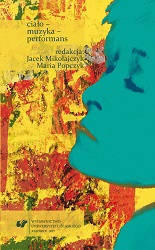Głos, muzyka, ciało w teatrze radiowym
Voice, Music and Body in Radio Theatre
Author(s): Ewa Wąchocka
Subject(s): Theatre, Dance, Performing Arts, Fine Arts / Performing Arts, Music, Sociology of Art
Published by: Wydawnictwo Uniwersytetu Śląskiego
Summary/Abstract: Radio plays in the subjective drama genre are one of the most interesting forms of contemporary radio theatre. The fragmentation of a character’s internal space and the cast of their internal drama serve to present that character’s story and are versatile tools for showing the workings of memory and man’s internal life. The non-visual quality of the radio, which eliminates the substantiality of the body and endows it with virtual existence, does not in fact obliterate the carnal factor completely – it can still be found in the actors’ vocal expression when the libretto comes alive in sound production. Carnality in a radio play can be thematic on the story level and manifest itself in the voice qualities of the actors together with sound effects and music. A polyphonic torrent of voices, which in subjective drama has replaced thetraditional one-track monologue, is often employed to illustrate the severing of ties between mind and body and, consequently, a split personality. The decomposition of psychosomatic integrity shown using multiple voices is more than just a radio play technique – it is also a powerful metaphor of human condition. The article presents diametrically opposed approaches to this phenomenon in Kwadrofonia by Ireneusz Iredyński and Samuel Beckett’s Cascando, analysed within the frameworks of phenomenology and psychoanalysis. The two plays explore contrasting portrayals of subjects in radio plays – a mind overpowered by others versus a fragile unity of alternative identities and a body with a marked presence in the story versus carnality that is both told and expressed in voice and sound.
Book: Ciało – muzyka – performans
- Page Range: 346-365
- Page Count: 20
- Publication Year: 2017
- Language: Polish
- Content File-PDF

